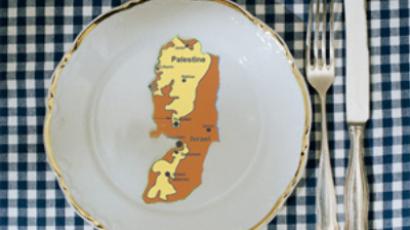Shi’ism comes from Iran to Sunni Gaza
Palestinian divisions in Gaza are offering a way in for Iran, which is bringing fears in the region over the motives of the dominant Shia power, in an area which is traditionally Sunni Muslim.
Especially as a crisis hit Hamas is desperate for help from whoever can provide it – in the form of money or weapons.
Palestinians are Sunnis by tradition and converting to Shi’ism is seen as betrayal.
“The Sunni says to the Shia, ‘we must fight you’,” said a woman who became one of the few Palestinians to convert to Shia Islam. She refused to name herself and show her face. No one in her family knows. She says if they find out they’ll kill her.
“I think Shia Islam, like it is in Iran, gives women the opportunity to participate in every sphere of society – in politics, in the courts, in theatre. It’s completely different to here, where I feel lost and never know if I acted rightly or wrongly,” she said.
Three-and-a-half years ago, Hamas was voted into power in Gaza. Since then the Strip’s become a battleground for violent confrontations between Palestinian factions – a situation ripe for Iran to capitalize on.
Since most of the world refuses to recognize them, Hamas leaders are taking help from wherever they can. Even if it’s from a country where 90 % of the population is Shia.
“People in Hamas, especially the founders, saw themselves belonging to the Sunni group, not to the Shia,” said Yohanan Tzoreff, professor at Bar Ilan University. “They understood that every support that you get, you have to pay for it. And the question is what kind of payment it’s going to be.”
The Israelis are worried about weapons, which they’re convinced are flooding into Gaza from Iran.
“There is very tangible Iranian support for Hamas, both [sic] in terms of finance, in weapons supply, [and] in diplomatic support,” said Mark Regev, spokesperson for the Israeli Prime Minister. “It’s a very tangible, hands-on support that Hamas receives from Iran.
“They boast about it; it’s public. And secondly, we’ve discovered all sorts of Iranian weapons show up in the Gaza Strip.”
However, Sheikh Ibrahim Sarsur – president of the Islamic movement in Israel – says it’s got nothing to do with the Sunni-Shia divide. In fact, he says, there’s no real difference between the two. The heart of the problem is Iran’s growing influence.
“I do not agree at all, totally, overwhelmingly with those [in the] Arab leadership who oppose Iran, believe me, not because Iran is Shia,” he said. “The Arab regimes, the Arab totalitarian regimes unfortunately, do not want this kind of regime, which is in a certain kind of sense a democratic regime in Iran.”
Hamas was among the first to congratulate Iranian President Mahmoud Ahmadinejad on his re-election. And the disorder on the streets of Gaza and in Ramallah’s parliament means Iran’s influence will grow.
“I think the talks are not progressing, they’re actually regressing, and we are now at a much further point from unity than we were last March,” said Dr Mustafa Barghouti, General- Secretary of Palestinian National Initiative.
Palestinian unity is further away than ever.
The next time Hamas and Fatah sit down together will be in August. But no-one’s really hopeful that this round of talks will yield anything new.













